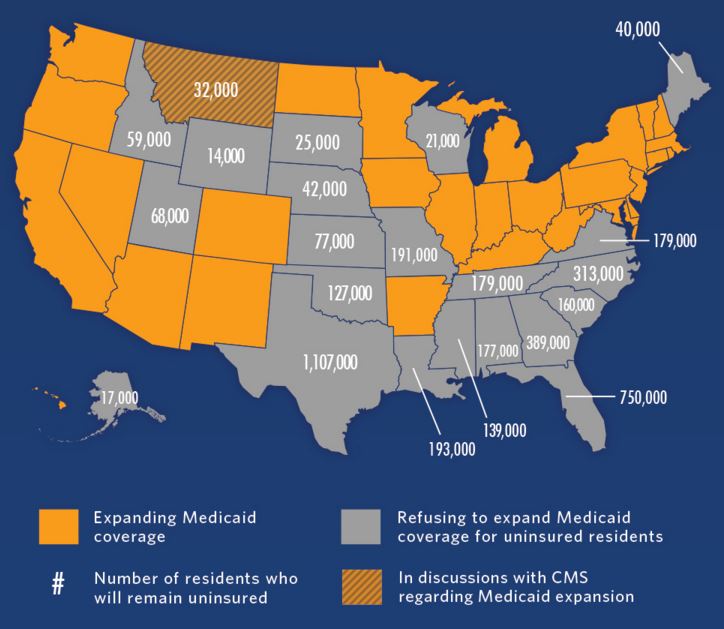Medicaid Expansion Brought More Cancer Screenings among Women
It was found that low-income women in states that expanded the Medicaid program were 25 percent more likely to obtain mammogram screenings.

- Several years ago, the Supreme Court ruled that state Medicaid expansion under the Patient Protection and Affordable Care Act is to be optional for each region. This led a large number of states to forego expanding their Medicaid program for many uninsured individuals.

While the Obama administration has set up a system to fund 100 percent of the Medicaid expansion until 2020 when it drops down to 90 percent, many state representatives have mentioned how increasing this type of health coverage would be a burden on their budgets.
However, a report from the Henry J. Kaiser Family Foundation and the Urban Institute shows that eight states may actually see cost savings due to Medicaid expansion under the Affordable Care Act. These states include Delaware, Iowa, Connecticut, Maryland, Maine, Massachusetts, New York, and Vermont. Part of these cost savings may be due to the fact that the “federal government pays a higher share of costs for some current eligibles.”
If all states undertook Medicaid expansion, spending for this program would rise by around $1.0 trillion between 2013 and 2022 with the federal government covering 93 percent of the costs. Among all 50 states, the costs would be $76 billion between the years 2013 to 2022.
More importantly, full Medicaid expansion among all 50 states would bring healthcare coverage to approximately an additional 21.3 million people by 2022. This is vital information, as it could make a real difference to the health of the American population.
For example, the Radiological Society of North America stated in a press release that low-income women in states that have expanded the Medicaid program have a higher likelihood of receiving recommended breast cancer screenings than in states that haven’t implemented Medicaid expansion.
“While increased use of screening mammography has significantly contributed to improved detection of breast cancer, substantial disparities in breast cancer screening exist among populations in the country,” the study's lead author, Soudabeh Fazeli Dehkordy, M.D., M.P.H., from St. John Providence Hospital, stated in the release. “We sought to determine whether increasing access to health insurance through Medicaid expansion has resulted in improved breast cancer screening adherence.”
The researchers used data from the 2008 and 2012 Behavioral Risk Factor Surveillance System to initially establish that low-income women in the states that chose not to expand Medicaid as well as the states that did implement the strategy had the same rates of breast cancer screening in 2008.
Then the researchers looked at data starting after Medicaid expansion took place among some states. It was found that low-income women in states that expanded the program were 25 percent more likely to obtain mammogram screenings.
“Adoption of Medicaid expansion by more states can result in considerable improvement of disparities in breast cancer screening, leading to better health outcomes for all women across the United States,” Dr. Fazeli Dehkordy concluded.
The White House sent out a release in 2013 that stated 5.4 million uninsured individuals would receive healthcare coverage by 2016 if the rest of the states that haven’t expanded their Medicaid program did so. Nebraska State Senator Jeremy Nordquist supports expansion of the program across his state.
“It’s often overlooked that Nebraska has a high number of uninsured in rural counties,” Nordquist said in a public statement. “Without expansion, rural hospitals will face growing financial challenges, which will undoubtedly lead to a reduction in the services they provide and – we are hearing – a real risk of these critical hospital closing their doors.”
“The good news is that the Nebraska Legislature is unique. We are nonpartisan, unicameral and constantly find ways to work together to move our state forward. On this issue, there is a strong bipartisan majority that supports expanding Medicaid. Providing access to quality, affordable health care should be a priority for all of us who represent the ‘good life’ in Nebraska. If all legislators and our Governor truly care about growing our economy and strengthening our health care system, we will pass Medicaid expansion in 2014.”
The press release further mentions that many state representatives may be more focused on partisan politics than ensuring the American people are given medical coverage and greater access to healthcare services.
Whatever the reason for blocking Medicaid expansion, it is clear that these actions have created a coverage gap for many Americans that the Affordable Care Act was meant to culminate.
Image Credit: Whitehouse.gov

